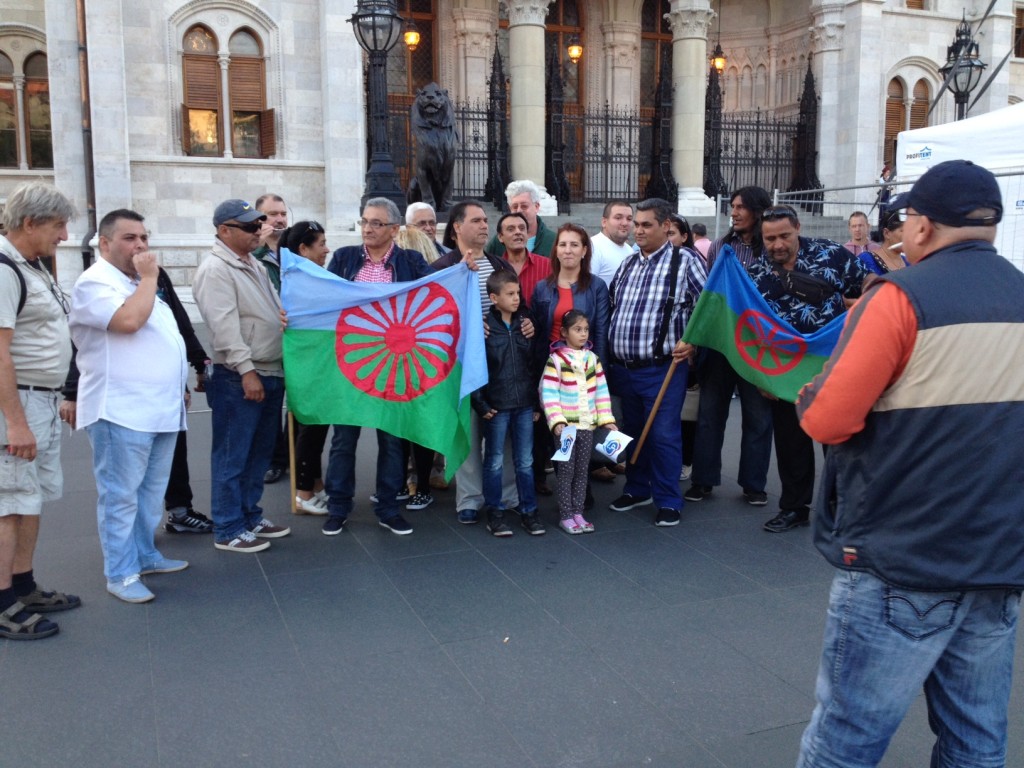We belong here! Hungarian activists fight back in refugee crisis

Hungary and Austria are in spitting distance from each other and share a lot of history. Yet in these past few weeks of European migrant crisis, the difference between their policies towards refugees has been stark.
The square in front of Budapest’s Keleti station, and the adjacent streets, have been teeming with hundreds or even thousands of migrants camping there for the night and waiting to be allowed to continue their journey westwards. The queues for the toilets are at least 10 metres long. Outside, mostly families, but many young men, seemingly lounge in the sun but when you look closer, feverishly check their mobile phones every few minutes. One of the families, a mother and father, their three young boys and a grandmother have been here for a week, and have no idea how they will get to Germany, their final destination. The lady working in the nearby café rolls her eyes at me as two of young men are struggling in broken English to ask for 4 kilos of white bread. Her unspoken message is ‘look what we have to put up with every day’. In the next street, I hear chanting by what we realize are far-right groups protesting about their country being overrun by foreigners. And around the corner, police in full riot gear sport an air of efficiency as they evidently get a message to regroup and rush to yet another hot-spot in the city, to keep things under a semblance of (increasingly military) control.
Meanwhile the Hungarian authorities have stopped all trains to Austria on several occasions and as of 15th September, have instituted a Parliament sanctioned state of emergency. This means, among other things, that illegal migrants run the risk of being imprisoned for up to three years (and there are signs that the Hungarian authorities mean business); that people helping them could also be considered criminals; that police can storm dwellings known to harbour refugees without a warrant; and that the army can use force against any that resist. It puts me in mind of shock doctrine tactics. I wouldn’t put it past Viktor Orban’s right wing government to use the refugee crisis as a smoke-screen to advance his own hidden agenda of curtailing citizen rights in Hungary.
Of course, all this is speculation. Yet, on a short stop-over in Vienna, I am struck by how the combination of political will and citizen mobilisation can make a huge difference to people’s experience of the same objective situation. In Austria, a completely different atmosphere prevails. Yes, the trains don’t work and even Germany has temporarily closed its borders. Still, I cannot help but notice telling signs of Austrian welcome and relaxed friendliness: the lady at the ticket counter jokes and chats as she explains the options open to travellers; in the queue for tickets, a young Asian man sports a sign showing that he speaks 5-6 languages and is there to help those who need interpretation; several clean-looking toilets have been erected on the platform and busy-looking volunteers push shopping trolleys full of bananas and water. Very few people looking like migrants are actually in the station and I am told that most of them have been housed in well-run shelters in local hospitals or schools. The general impression I get is that of hospitality and care. Perhaps my view is coloured by staying with an equally welcoming friend who tells me that Vienna has many times in the past been a haven for refugees: after World War II, after the Hungarian revolution of 1956, after the Czech uprisings in 1968 and during the Yugoslav war, it took in more than its fair share of conflict-stranded people. On occasion, its population swelled by up to 20-40%, yet local politicians’ and citizens’ attitude remained on the whole, open, even in recent times when the Austrian Freedom Party (FPÖ) has been gaining in strength.
Across the border, from the Hungarian media’s anti-refugee tone, you could almost be forgiven for thinking that all is doom and gloom and that Hungarian citizens are passively putting up with the hegemony of xenophobia that has characterized their political class. Yet nothing could be further from the truth. From the signs of early help offered by tireless voluntary groups, to courageous politicians putting their jobs and sometimes their safety on the line to protest, there are hopeful signs that this crisis has done what many crises do so well: awaken ordinary citizens to the realisation that they either stand up to discrimination of their fellow humans or find their own lives diminished and endangered by it.
So it is to my great delight that I arrive back from Vienna to facebook messages from activist friends announcing a demonstration organized by opposition party Együtt. Fresh off the plane, I join the demo and find the Roma contingent. Unlike the riotous occasions of London, the line of protesters is subdued and quiet as it winds its way towards the Parliament square, but once there, it erupts in cheers and chants that accompany the speeches. When Jenő Setét, one of Hungary’s most prominent Roma rights activist, takes the stage, his message resonates with the crowd as they begin to chant. In reference to the Hungarian Prime Minister’s incendiary statements last week, he sets out his unwavering belief in unity between those oppressed:
‘Hungarian politics keeps harping on about the burden of 800 thousand Gypsies living here, which is why we can’t accommodate the refugees. But this is not true. There isn’t a single thing the refugees have taken away from me. […] There is something the refugees and Hungarian Gypsies do have in common. That is the mistreatment of both groups. I am here to refute those words from Viktor Orbán and all the other Hungarian politicians, when they use us as ammunition to shoot at Europe. […] There was power that meant only to rule over people, and considered them objects. Then people vested themselves with civil rights.’
In reference to the images of a journalist associated with far right party Jobbik kicking a refugee, the organizer of today’s protest, politician Juhász Péter, had this to say:
‘Whoever’s politics lead to this has evidently failed. It cannot be in Hungary’s interest for its citizens to be associated with such violence. Petra László is the product of Orbán. This is where Orbán’s campaign of hate has led us.’
The citizens of Hungary slowly but surely seem to be shaking off the shock and apathy that has gripped them for the past few years: on the morning when the government’s draconian anti-refugee measures come into effect, a group of legal professionals issues a letter stating that the new rules are unlawful and a group of protesters gather at the Serbian border.
Then, randomly, a small newspaper headline catches my attention as I trawl the internet – it states that, contrary to the depressing news earlier this Spring, left-leaning parties are on the rise, and Jobbik has fallen in the public’s ratings. As we all know, polls can be deceiving – and who could have predicted the extraordinary political earthquake of Corby’s victory that has swept the UK in the past week? I look forward to the day when in Hungary too, my good friend Jenő Setét is elected to high political office. Until then, we concentrate on organizing.



Leave a Reply